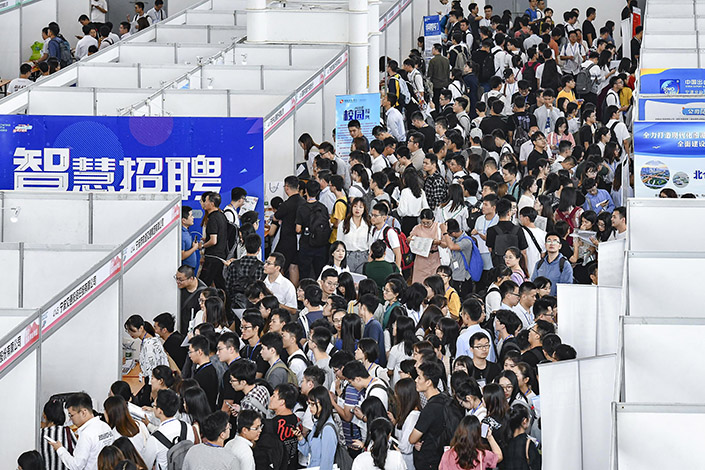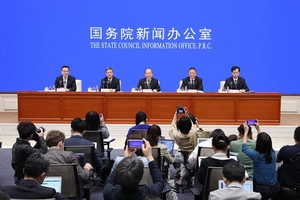In Depth: Relaxed Residency Rules in Yangtze Delta Aim to Poach Talent From Biggest Cities

When 29-year-old university lecturer surname named Wei arrived at his new job in the eastern city of Suzhou last September, he received his new household registration — or “hukou” — within the day. The young doctoral graduate had chosen Suzhou as his next home.
Wei, who like most students had his household registration documents held at his university in Beijing for the duration of his studies, transferred his hukou to Suzhou with his wife to start a new life there, having secured jobs in the city. Their new apartment in the city of 12.75 million was their very own.
Unlike many young people who move to megacities like Beijing and Shanghai for work, Wei said he didn’t have a strong preference for either. Instead, he followed his wife to Suzhou when she got a job there, and focused on finding the right job opportunity for himself.
As China’s population ages, smaller cities across the country have relaxed their rules on household registration in a bid to attract more young and talented workers, in line with a central government push to encourage more people to move to all but the biggest cities in the country. In the Yangtze River Delta region, cities including Hangzhou, Nanjing, and Wuxi have been announcing new hukou-related policies since late last year.
In China, household registrations are linked to access to social security and education, as well as the possibility of purchasing a home or registering a vehicle license plate. People who wish to transfer their hukou to another city are usually required to first live and work there for a period of time. In China’s megacities, this period of residential uncertainty can last up to a decade. Hukou-seekers in Shanghai and Beijing have to contribute to the city’s social insurance system as employees for at least seven years.
In addition, those in Beijing also have to accumulate “points,” which are given for employment, educational background and other criteria. This year, some 130,000 people applied for a Beijing hukou but only 6,045 qualified, according to local authorities.
Last year, 14 Chinese cities reported natural population declines, including five northeastern cities and several in the east, including Wuxi and Zhenjiang, according to domestic media reports.
After decades of state family planning policies that limited the number of children couples could have, the country has been left with a fertility rate of as low as 1.3, coupled with an increasingly older demographic, with some 190 million residents, or 13.5% of the total population, aged 65 or older. Meanwhile, the country’s working age population is in decline. In 2019, 896.4 million people or 64% of the total population were aged 16-59, according to the National Statistics Bureau. However, this figure was down from 919.54 million in 2013, when the group accounted for 67.6% of the total population.
Lu Jiehua, professor at Peking University, told domestic media outlet 21st Century Business Herald that China’s migrant population, which had been growing since 2000, began to slide in 2015. “For policymakers in many cities, there has been a growing realization that economic development needs to gather manpower,” he said. “And that population data is a barometer of a city’s economic and social development, so more and more cities are relaxing their household registration policies.”
Moving down a tier
In March, Suzhou grabbed media attention after popular influencer Zhang Xuefeng, who lectures on postgraduate studies, said in a post on the microblogging platform Weibo that he has settled in the second-tier city after living in Beijing for 14 years. Many have echoed Zhang’s choice by moving to smaller cities from Beijing, which has made it hard for migrants to get a hukou.
In March, the eastern city of Suzhou announced new policies permitting those with at least a college degree to receive a hukou directly without needing to first make local social security payments. In the past year alone, the city’s industrial park made some 16,200 people official residents, according to local authorities.
And last month, the city issued a call for talent in certain specific fields, including artificial intelligence trainers and welders. The policy went into effect on June 15.
Suzhou is not the only city in the region hoping to attract more young workers. Nanjing, Nantong and Wuxi have all introduced new policies in recent months.
In February, four of 11 districts of Nanjing, the capital of Jiangsu province, announced that people who pay social insurance for six months will be eligible for local hukou, a dramatic drop from the two years previously required. And in late May, Nanjing further relaxed its policies for the next three years, allowing all bachelor’s degree holders under 45 to transfer their hukou to Nanjing. The previous cutoff age was 40.
Nantong also released new policies in April, scrapping restrictions for anyone with a junior college diploma or above who was willing to work in the city’s Chongchuan district. Moreover, holders of a master’s degree would receive a housing allowance of 200,000 yuan ($31,000) or have their rent halved for three years if they applied to stay in designated “talent apartments.”
Many cities are relaxing their hukou-related policies as they follow general guidance from the central government, as well as catering to their own needs, a Shanghai-based expert told Caixin. However, whether the adjustments actually attract people to transfer their hukou remains unclear, he said, as people want to know that employment and other benefits in the new city they move to can be guaranteed, especially those from rural areas.
Despite policy changes, the attractiveness of cities in the Yangtze River Delta region to migrants may still fall short of the perks of living in neighboring megacity Shanghai, the expert said. “Shanghai certainly has an advantage over neighboring cities in terms of attracting migrants, and the tendency to attract some highly skilled workers is more evident,” he said.
Ordered from the top
In recent years, central authorities have issued documents regarding household registration policies, setting out guidelines for their local counterparts.
In December 2019, the central government signaled it would scrap residency requirements for cities with populations of less than 3 million, with plans to extend the change to cities of up to 5 million. The 2014 national urbanization plan set a goal of having 100 million rural residents living in urban areas with urban hukou by 2020. However, last year’s figures show that while 60.6% of China’s population was living in urban areas, only 44.4% held urban hukou.
Since last year, nearly a dozen cities in China have relaxed their hukou policies, according to domestic media reports. These cities include Qingdao and Hefei in East China, and Dongguan in the south. In February, authorities in East China’s Jiangxi province abandoned its restrictions altogether, permitting people from rural areas to obtain household registration in the cities they’d moved to with no restrictions.
In January, the State Council, China’s cabinet, issued an action plan (link in Chinese), for “Building a High-Standard Market System,” which set out plans to launch pilot projects in metropolitan areas that would give individuals unified residential records, making switching to permanent residential status easier upon relocation.
In April, the country’s top economic planning agency, the National Development and Reform Commission, issued a document urging local authorities to help certain groups of rural migrants obtain urban household registration, including students and those who had worked and lived locally for more than five years.
Contact reporter Cai Xuejiao (xuejiaocai@caixin.com) and editor Heather Mowbray (heathermowbray@caixin.com)
Download our app to receive breaking news alerts and read the news on the go.
Get our weekly free Must-Read newsletter.

- PODCAST
- MOST POPULAR






